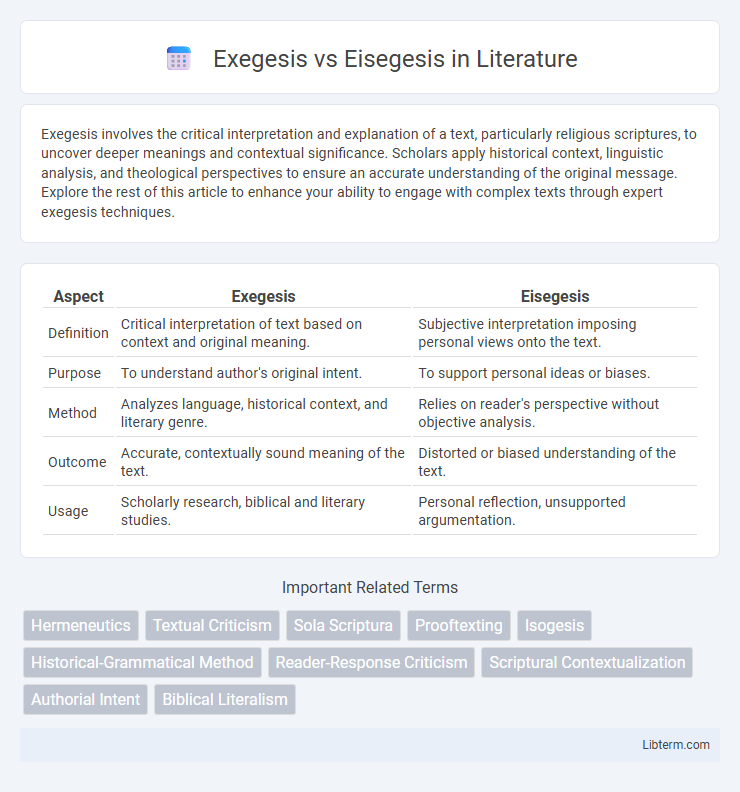Exegesis involves the critical interpretation and explanation of a text, particularly religious scriptures, to uncover deeper meanings and contextual significance. Scholars apply historical context, linguistic analysis, and theological perspectives to ensure an accurate understanding of the original message. Explore the rest of this article to enhance your ability to engage with complex texts through expert exegesis techniques.
Table of Comparison
| Aspect | Exegesis | Eisegesis |
|---|---|---|
| Definition | Critical interpretation of text based on context and original meaning. | Subjective interpretation imposing personal views onto the text. |
| Purpose | To understand author's original intent. | To support personal ideas or biases. |
| Method | Analyzes language, historical context, and literary genre. | Relies on reader's perspective without objective analysis. |
| Outcome | Accurate, contextually sound meaning of the text. | Distorted or biased understanding of the text. |
| Usage | Scholarly research, biblical and literary studies. | Personal reflection, unsupported argumentation. |
Understanding Exegesis: Definition and Purpose
Exegesis refers to the critical interpretation and explanation of a text, particularly religious scriptures, aiming to uncover the original intended meaning through contextual analysis, linguistic study, and historical background. Its primary purpose is to provide an objective, well-supported understanding of the text that respects the author's intent and the cultural setting in which it was written. Exegesis forms the foundation for accurate theological study and religious teachings by distinguishing informed interpretation from subjective or biased readings.
Defining Eisegesis: Meaning and Implications
Eisegesis involves interpreting a text, especially scripture, by projecting one's own biases or preconceived ideas onto it, often leading to distorted meanings. This method contrasts sharply with exegesis, which seeks to uncover the original intent and context of the text. Eisegesis can result in misleading conclusions and misapplications, undermining scholarly and theological integrity.
Key Differences Between Exegesis and Eisegesis
Exegesis involves interpreting a text by carefully analyzing its context, language, and original meaning, ensuring an objective understanding aligned with the author's intent. Eisegesis, in contrast, occurs when a reader projects personal biases or assumptions onto the text, leading to subjective interpretations that distort its original message. The key difference lies in exegesis seeking to extract the text's true meaning versus eisegesis imposing external ideas onto the text.
Historical Development of Biblical Interpretation
The historical development of biblical interpretation reveals that exegesis emerged as a disciplined method rooted in the early Church Fathers' efforts to uncover the original meaning of Scripture through context and language analysis. Eisegesis, by contrast, evolved as a less rigorous approach where interpreters project their own biases into the text, often leading to subjective readings. Throughout history, scholarly movements such as the Protestant Reformation emphasized exegesis to restore scriptural authority, marking a critical shift in hermeneutical practice.
Methods and Techniques in Exegesis
Exegesis employs analytical methods such as lexical analysis, historical context evaluation, and grammatical interpretation to uncover the original meaning of a text, ensuring objectivity and fidelity to the author's intent. Techniques in exegesis include textual criticism, which compares manuscript variants, and the use of commentaries and linguistic tools like concordances and syntax analysis to deepen understanding. This method contrasts with eisegesis, where personal bias or external interpretation distorts the text's message rather than revealing its inherent meaning.
Common Pitfalls Associated with Eisegesis
Eisegesis often leads to common pitfalls such as imposing personal biases onto the biblical text, resulting in distorted interpretations that deviate from the original meaning. This approach ignores critical contextual factors like historical background, literary genre, and authorial intent, causing readers to misinterpret key theological concepts. Unlike exegesis, which seeks to objectively extract meaning, eisegesis frequently produces subjective and theologically unsound conclusions.
The Role of Context in Accurate Interpretation
Exegesis emphasizes the importance of analyzing the historical, cultural, and literary context of a text to uncover its original meaning, ensuring an objective interpretation based on authorial intent. Eisegesis, in contrast, involves reading personal biases or contemporary ideas into the text, often leading to misinterpretation by neglecting contextual factors. Accurate biblical interpretation relies heavily on exegesis to maintain fidelity to the text's intended message and avoid distortions caused by imposing external viewpoints.
Case Studies: Exegesis vs Eisegesis in Practice
Case studies comparing exegesis and eisegesis highlight the impact of interpretive methods on biblical texts, where exegesis involves rigorous analysis of historical context and original language to uncover intended meaning. In contrast, eisegesis imposes the interpreter's own biases or contemporary viewpoints, often distorting the text's true message. Scholarly reviews of landmark sermons and theological writings reveal that rigorous exegesis fosters doctrinal accuracy, whereas eisegesis frequently leads to misinterpretations and controversial theological stances.
Theological Impacts of Interpretation Methods
Exegesis involves drawing meaning directly from the biblical text based on context and original language, ensuring theological interpretations align closely with intended doctrines and historical understanding. Eisegesis, by contrast, imposes the interpreter's own biases or ideas onto the scripture, which can lead to distorted doctrines and theological errors. Theological impacts of these methods affect doctrinal purity, biblical authority, and the integrity of faith teachings within Christian communities.
Best Practices for Responsible Scripture Study
Exegesis involves extracting the original meaning of scripture by analyzing context, language, and historical background, ensuring an accurate and objective interpretation. Eisegesis, by contrast, imposes personal biases or preconceived notions onto the text, often leading to distorted understandings. Best practices for responsible scripture study prioritize rigorous exegesis, including consulting multiple translations, utilizing scholarly commentaries, and maintaining awareness of one's interpretive influences to preserve the integrity of the text.
Exegesis Infographic

 libterm.com
libterm.com